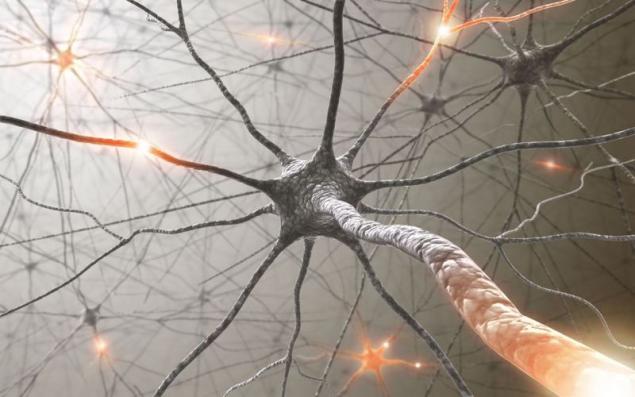730
Myth or reality: the brain, "shocked" motherhood
Young mothers and people close to them may not be astonished by this fact: in pregnancy, the brain actually decreases for a few months. In 1997 Anita Holdcroft, anesthesiologist, and her colleagues from the Royal school improvements health workers in London have used the technology of magnetic resonance imaging (MRI), to scan and measure brain volume of eight healthy women.

Previously, scientists found evidence of reducing the size of the brain in pregnant women suffering from preeclampsia (a dangerous condition is found more often than every twentieth pregnant, it is characterized by high blood pressure).
Holdcroft wanted to know, do you see this phenomenon in women who did not have health problems. She found a significant reduction in the size of the brain — one of the volunteers fell by almost 7%, the index reached a peak by the time of birth and returned to normal levels within six months.
One of the British media released an article whose title is rude equated the news to the idea of "Child... eating my brain"; the authors have made conclusions are more restrained, but essentially meant the same thing. They suggested that some portion of the physical resources of a pregnant woman is temporarily redirected from the brain, the main energy absorber, to the enrichment of the growing fetus.
We still have no technology that allowed to know what exactly happens to a woman's brain during this critical period, but thanks to the rats, we know a lot in theory. When Craig Kinsley and his colleague Kelly Lambert from College Randolph-Macon (VA), dissected the brain of rats in the later stages of pregnancy, they found a complex redistribution of neural pathways in the hippocampus — the center of learning and memory. Neurogenesis — the continuous production of new brain cells, neurons, — slowed, perhaps this explains the decrease in the volume of the brain recorded Holdcroft. However, the nerve cells in the hippocampus formed a lot of new dendritic spines.
It is time, however, to interrupt our story, to Express the picturesque framework of brain science. Each neuron, or brain cell, has a long trunk and branches, so it looks roughly like a tree in late winter. The branches are called dendrites, they can tie a kidney dendritic spines. In the centre of the branches is the cell body, it contains the kernel and other parts necessary for the sustenance of the neuron. The long trunk is the axon, a sort of information highway.

Now imagine a dense forest in the brain — around one hundred billion neurons with their dendrites winding. Dendritic spines are located very close, but not close to AXOS other neurons.Information — thoughts and feelings — travels through neurons in the form of chemical neurotransmitters, which are accumulated until the mixture becomes sufficient to generate the electrical pulse. He takes them through small gaps, so that the transmitters are faced with dendritic spines of other cells. Tiny gaps called synapses.
Every time you think or act in unusual ways, such as worry about the welfare of the child, or advise him to look both ways before crossing the street, some of the new connections in the brain are strengthened. Such changes occur every time you repeat the thought or action. This is the essence of learning; now you will understand the saying, coined by scientists: "Neurons that fire together, shoot together and grows stronger."
What is the value described lush flowering of dendritic spines, demonstrating the creation of many new synapses (recall that Kinsley and Lambert watched this process in the hippocampus of pregnant rats), remains controversial. Perhaps such lush growth leads including the emergence of a lot of women have feelings of heightened distraction. But Kinsley compares optimistic to see the phenomenon of chaos in a toy factory right before Christmas or the computer, which added another processor, so now he can perform more operations simultaneously.In all these examples, the innovation may cause some difficulties, but in the long term we expect a big win. About mother rats and their offspring Kinsley and Lambert write that "the neural activity caused by pregnancy and the presence of rats, can literally restructure the brain, resulting in modeled the new body that is able to adapt to the increased demands of the environment."
At the heart of this transformation lies the powerful "sauce" from reproductive hormones, "washing" the brain pregnant. According to some estimates, in the last weeks of pregnancy the level of three types of estrogen increases several hundred times the norm. The rate of progesterone increases ten-fold, and the level of the stress hormone cortisol could double.
Many scientists suggest that this "mixture" has the ingredients that obscures the mind of a woman, perhaps only in order to reliably forgot about the pain that accompanies pregnancy and childbirth, and again were able to reproduce. However, there is no consensus on which hormone is the main culprit of the process, and despite some circumstantial evidence, we don't have a clear understanding of cause and effect.
Liisa Galea, a Professor of psychology at the University of British Columbia (Canada), believes the Prime suspect estrogen. Of Galea in the last weeks of pregnancy are faced with the fact that I could not find Parking on campus your vehicle. She conducted experiments on pregnant rats and studied their behavior in the water maze. Before rodents were challenged to memorize the changing position of the floating platform and get to a safe place. Pregnancy in rats lasts three weeks. In the third trimester, when estrogen is the highest, the animals gave the worst performance.
A curious fact: in many literary sources is found in the assumption that in the right circumstances, estrogen acts on the brain restorative. Studies show that young women feel smarter during periods of the menstrual cycle when estrogen is at its peak; they cope better with certain tasks, in particular, associated with fluent speech.
Several trials have shown that estrogen-replacement therapy helps to minimize the deterioration of verbal memory in women after menopause. It is known that a hormone takes part in the formation of new synapses, such discovered in the brain of pregnant rats Kinsley and Lambert, as well as in neurogenesis. But due to the fact that scientists still don't understand how to affect the memory of the high concentration of estrogen, Galea suggests that "all these new synapses can only temporarily increase noise levels".
Obviously, the question regarding the effect of estrogen still remains open, and the researchers put forward the theory that another hormone, progesterone, causes far more problems. Her supporters refer to the results of the following studies: subjects female volunteers taking the oral progesterone, so its level in blood was comparable to that occurring in the later stages of pregnancy, showed a significant deterioration in the ability to remember items they read a piece of text. Another camp of experts suggests that increased distraction causes occurring during pregnancy high levels of the stress hormone — glucocorticoid cortisol. Cortisol can increase alertness — this hormone is involved in the formation of the reaction "fight or flight". But, as noted Merzenich, cortisol also focuses the mind on the most important challenges.
Recently obtained preliminary results allow to assume that in search of a Smoking gun in the drama "the Motherhood of the brain" for many years ignored another key factor. In late 2004, two researchers from the University Simon Fraser (Canada) announced that in the course of complex experiments, found the following: the deterioration of cognitive abilities show that women pregnant with girls. Those who were waiting for the boys, there were no problems. If the results of the experiment, at the time of this writing, not yet published, can be played, it might shed light on the fascinating biological interaction between the mother and the unborn baby.
No matter how heavy the burden of parenthood, especially in the beginning, the most maddening, of course, lack of sleep. To prevent a person to sleep means "to undermine the balance and sanity," as formulated by psychotherapist John Schlapobersky, which in the 1960s was tortured by the South African government during the apartheid era. Sleep deprivation is a well known torture technique used by military interrogators around the world. However, despite understanding how lack of sleep affects the brain, many young mothers are not ready for this aspect of interaction with the newborn, even though with proper training and skills damage can be greatly reduced.
James Maas, Professor of psychology at Cornell University, argues that in the first year of a baby's life responsible caregiver (whether mother or father, or someone else) loses up to seven hours of sleep. Maas says that parents may underestimate the impact, explaining the sudden mood swings, for example, the fact that the spouse (a) sitting and reading the newspaper, while you carry on hands hysterically crying baby.
"Is something wrong not just with my marriage, but also with the brain!" — I think sometimes young mothers are wrong on both counts.In fact, they just want to organize your life so that you have the opportunity often to go to sleep. The reason is that the frontal division of the cerebral cortex that allows us to stay sharp, stay focused, be original and flexible, with prolonged deprivation of sleep is the first victim. Laboratory studies show that in volunteers with a sleep deficit is shrinking vocabulary, they often use clichés, they encounter problems with the creative solution of complex problems.
Robert Sapolsky, Professor of biology at Stanford University and a leading American expert on stress, says that he never would come to learn lack of sleep, until he became a father, but now this problem seems to be a key. "Sleep deprivation associated with the emergence of a newborn is the worst, he says. — If it decreases the total number of hours of sleep, it is stressful for the system, it affects the mood, you fall into depression, diminished cognitive function. Even worse, if sleep is not only too short, but fragmented. But the worst — when sleep is too short and unpredictable fragmented. No coincidence that on-duty residents often mentally ill people."
The mechanics of the process Sapolsky communicates with the above-mentioned hormones of stress — glucocorticoids, with their irritating effect on the brain. Even when we sleep, these hormones are working according to our internal clock. "If you go to sleep, waiting for a lift at five in the morning, increased stress hormone levels will start at four, because normally, they are produced in the blood about an hour before spontaneous awakening, says Sapolsky. But if you go to sleep expecting to be awakened at any moment, you always psychologically prepare for the stress of awakening." In other words, speaking only about the number of hours you could get your normal night's sleep, but you will be in this tension that the rest will be useless.
From my own experience, the effect of being able to awaken at any moment, can be further strengthened: sometimes we don't know exactly how we will Wake. It is likely that someone will try to explore your nose, or stick his finger in the eye, or rammed your head, or, worse, hail from the side of the highway. My brother Jim told how he once woke three year old son: he lifted his head, exclaimed, "Oh, no!" and scooted ran to my mother.
Although some sleep disturbances are unavoidable, you can take steps to reduce the future consequences. It's important to periodically doze off; be sure to discuss it with my husband, partner, mother, babysitter, a neighbor or even boss. (Maas recommends a twenty-minute restorative, and the best half-hour sleep — short breaks, when you lie down and doze, instead of jam, coffee and Cola. But, obviously, it will not help the huge number of working mothers, whose office it is impossible to organize such a private space.) Sapolsky cautions against too long between meals when you have a sleep deficit: given that the level of stress hormones are already elevated, the brain receives less glucose than normal normal. To avoid "roller coaster" due to major blood sugar swings, he advises young parents to "switch to hunter-gatherers — a lot of little snacks throughout the day."
So, here are the starting conditions: your brain is reduced, pickled and stretched. You have been hit by injury and was fried by lack of sleep. You have a new brain, "affected" by motherhood. But as to whether this "device" is broken, even temporarily? The evidence simply does not.
In 1998 and 1999 were published two studies, the most convincing evidence of brain damage. In the first, researchers from Wayne state University (Detroit) under the supervision of Pamela Keenan compared the pregnant women in the third trimester with a control group and found that pregnant women forget details they read a passage about 15% more often. (Three months after birth, they were back on equal footing with the others.)
A year later George. Galen is Buckwalter, a psychologist from the University of southern California, said that when pregnant students medical tested verbal memory (the ability to play lists of words) and studied their ability to learn, women in the later stages, and up to two months after birth "literally covered".
As later noted, other experts, both of these experiment was not completely correct. Each involved a very small sample (only ten women in the experiment, Keenan and nineteen of Buckwalter), the results are not tried to reproduce. Also Buckwalter did not compare pregnant volunteers with the control group, i.e. non-pregnant women selected taking into account such factors as age and IQ level. As acknowledged by Keenan in an email sent to me in 2003, "we don't have enough reliable data to clear the questions there is shortage of memory associated with pregnancy".
Moreover, after some time in Australia and the UK there have been three other large studies suggesting that, taking the expression of Helen Christensen, "pregnancy brain is a myth." Christensen, a cognitive psychologist at the Australian national University, admits that as a "Mature mother" of three children, noticing a strange behavior (for example, during pregnancy she was cleaning the washing powder in the fridge), felt to the subject of personal interest. But she had a doubt, does the pregnancy brain drain by itself. "I assumed that the reasons may be fatigue, lack of sleep and excitement about the upcoming event, but were not convinced whether this is due to brain damage," says Christensen.
In 1999, Helen has conducted a study of verbal memory, short-term "working memory" (plays role in learning, the formation of inference and understanding) and attention. The experiment involved fifty-two pregnant women and a control group of thirty five people. Also studied was the mood of the subjects. Christensen found only one significant difference between the two groups: pregnant women really are better learned and remembered the terms that were relevant to their condition. For example, they perked up, when he heard the word "hospital", "placenta" and "childbirth". "It's kind of "the effect of party," says the psychologist. Despite the noise, you hear your name, even if it is said on the other end of the room." Repeat the experiment, conducted by her colleague, showed similar results. Christensen boldly published an article called "Motherhood can provide a selective cognitive advantage."
Scientists at the Charles Sturt University (Australia) confirmed the findings. For sixteen months they have conducted studies of memory among the three dozen women, divided into groups: pregnant, have recently given birth and a control group of volunteers. The subjects were asked to keep diaries. In the records of both the parent groups noted that with each passing day they seem to forget more and more. One woman described how he drove to the intersection and suddenly found that can not remember what signal gives a red light — stop or go. Another told how he traveled more than a hundred miles on back roads to borrow my sister's ladder, but forgot to move her. However, the performance of these women during objective testing did not differ from the control group. "Pregnant women and young mothers should know that ceteris paribus can use their normal cognitive abilities fully," the scientists say.
Finally, in another small study conducted in 2003 under the leadership of psychologist Roz Crowley from the University of Sunderland (UK), organized a test of verbal memory, divided attention and focused attention fifteen women in the state. During pregnancy and postpartum results were compared with a control group. The data again showed that objective testing of differences between groups no, although pregnant women feel inferior. According to Crowley, they are so confident in the effects of the "maternal brain" because of their own negative expectations: women in advance, waiting for that pregnancy will affect you stupid.
Here we enter into the truly interesting area.Forget you, where to put the washing powder, due to the fact that the child ate your neurons? Or rather that we're taught to expect problems, and as a result, having made a mistake, we are relieved to resort to the stereotypical explanation?
Today is a hard mental labor were more women with young children than ever before. Arose the ideal circumstances to deal with emerging problems. At the same time, the cliché "the motherhood of the brain" suggests that the problem encountered, probably due to our new reproductive status.
In the study, Australian national University most pregnant women cope with cognitive tasks as well or better than the control group, thought that their memory is worse. As suggested by Christensen, small but dramatic episodes of forgetfulness, pregnant explained their condition, while other women consider them to be ordinary troubles and quickly forgot about such cases.
Australian psychologist Paul Casey, the leading specialist research teams of Charles Sturt University, noted that several study participants began to complain of memory problems with the pregnancy, though, according to Keenan and Buckwalter, objective differences are manifested in the third trimester.
Casey suggests that really changed the "a's metaconscious" women: how they perceive and evaluate their own cognitive processes. In a previous study, Casey found that increased attentiveness to yourself and the stories about forgetfulness often go hand in hand. Casey considers it quite possible that pregnant, which are known to be deeply immersed in their own feelings, just remember all the cases where something was overlooked. "And this, concludes Casey, is in itself speaks about the excellent memory."
Often the stereotype of the "brain drain" is supported by the friends and acquaintances of pregnant women and young mothers, as well as culture. You can be a Nobel laureate, but the nurse on reception at the pediatrician calls you "mommy." And in all the magazines says that your main goal in life is to achieve a flat stomach.
"You constantly patronize, says Laura Hilgers, my colleague, a freelance writer, we know, because our children learn together. I just had a baby, I don't have a lobotomy. But when you go to the people, it soon becomes clear that, even if you are perceived as an equal, now your place is in the kitchen."
If mother suspected I'd meet such a dismissive attitude, they can take steps to protect yourself. Neuropsychologist Julie sur of Ohio state University recalled how at the age of three months, her daughter became ill with viral meningitis. "I knew she was very sick, but she had no temperature and I do not doubt that I will consider the hysterical young mother, she says. — As our pediatrician worked in the same hospital as me, on the way to the reception, I walked into the office and threw his own white robe to show you a badge, "Dr sur". I obviously acted according to their ideas about how they'll treat me".
In fact, sur is an expert on the expectations. She specializiruetsya on studies of the threat of confirming the stereotype — the authorship of the term belongs to Claude Touch, a psychologist at Stanford University. The threat of confirming the stereotype means that if the representative of a particular group, performing a task, said that other members of his group coped with it badly, it will show in the end, the worst result, than if he had no prejudices.
Ethnic minorities accordingly to the expectations that they do not perform tests of achievement, on average, do so. The same thing happens with women, influenced by the opinion that they do not solve math problems. Ideally, the mechanism of the stereotype of the "maternal brain" reveals the following experiment. Elderly people previously subjected to subliminal processing of negative age stereotypes demonstrated worse results in cognitive tests than a group of elderly people, which has had a positive impact. Working mother, filled with negative stereotypes, can be similarly situated for failure.
Inspired by our conversation, in 2004, sur started work on an experiment whose purpose was to determine if stereotypes about "mothers brain" on the cognitive functioning of young mothers. "You'd be surprised what a bit is needed to activate our own negative biases," she says. In this respect, unrealistic expectations can lead very far. "For many young mothers, even small error is inexcusable, says sur, — while the rest of humanity easily forgets about them." published
P. S. And remember, just changing your mind — together we change the world! ©
Source: theoryandpractice.ru

Previously, scientists found evidence of reducing the size of the brain in pregnant women suffering from preeclampsia (a dangerous condition is found more often than every twentieth pregnant, it is characterized by high blood pressure).
Holdcroft wanted to know, do you see this phenomenon in women who did not have health problems. She found a significant reduction in the size of the brain — one of the volunteers fell by almost 7%, the index reached a peak by the time of birth and returned to normal levels within six months.
One of the British media released an article whose title is rude equated the news to the idea of "Child... eating my brain"; the authors have made conclusions are more restrained, but essentially meant the same thing. They suggested that some portion of the physical resources of a pregnant woman is temporarily redirected from the brain, the main energy absorber, to the enrichment of the growing fetus.
We still have no technology that allowed to know what exactly happens to a woman's brain during this critical period, but thanks to the rats, we know a lot in theory. When Craig Kinsley and his colleague Kelly Lambert from College Randolph-Macon (VA), dissected the brain of rats in the later stages of pregnancy, they found a complex redistribution of neural pathways in the hippocampus — the center of learning and memory. Neurogenesis — the continuous production of new brain cells, neurons, — slowed, perhaps this explains the decrease in the volume of the brain recorded Holdcroft. However, the nerve cells in the hippocampus formed a lot of new dendritic spines.
It is time, however, to interrupt our story, to Express the picturesque framework of brain science. Each neuron, or brain cell, has a long trunk and branches, so it looks roughly like a tree in late winter. The branches are called dendrites, they can tie a kidney dendritic spines. In the centre of the branches is the cell body, it contains the kernel and other parts necessary for the sustenance of the neuron. The long trunk is the axon, a sort of information highway.

Now imagine a dense forest in the brain — around one hundred billion neurons with their dendrites winding. Dendritic spines are located very close, but not close to AXOS other neurons.Information — thoughts and feelings — travels through neurons in the form of chemical neurotransmitters, which are accumulated until the mixture becomes sufficient to generate the electrical pulse. He takes them through small gaps, so that the transmitters are faced with dendritic spines of other cells. Tiny gaps called synapses.
Every time you think or act in unusual ways, such as worry about the welfare of the child, or advise him to look both ways before crossing the street, some of the new connections in the brain are strengthened. Such changes occur every time you repeat the thought or action. This is the essence of learning; now you will understand the saying, coined by scientists: "Neurons that fire together, shoot together and grows stronger."
What is the value described lush flowering of dendritic spines, demonstrating the creation of many new synapses (recall that Kinsley and Lambert watched this process in the hippocampus of pregnant rats), remains controversial. Perhaps such lush growth leads including the emergence of a lot of women have feelings of heightened distraction. But Kinsley compares optimistic to see the phenomenon of chaos in a toy factory right before Christmas or the computer, which added another processor, so now he can perform more operations simultaneously.In all these examples, the innovation may cause some difficulties, but in the long term we expect a big win. About mother rats and their offspring Kinsley and Lambert write that "the neural activity caused by pregnancy and the presence of rats, can literally restructure the brain, resulting in modeled the new body that is able to adapt to the increased demands of the environment."
At the heart of this transformation lies the powerful "sauce" from reproductive hormones, "washing" the brain pregnant. According to some estimates, in the last weeks of pregnancy the level of three types of estrogen increases several hundred times the norm. The rate of progesterone increases ten-fold, and the level of the stress hormone cortisol could double.
Many scientists suggest that this "mixture" has the ingredients that obscures the mind of a woman, perhaps only in order to reliably forgot about the pain that accompanies pregnancy and childbirth, and again were able to reproduce. However, there is no consensus on which hormone is the main culprit of the process, and despite some circumstantial evidence, we don't have a clear understanding of cause and effect.
Liisa Galea, a Professor of psychology at the University of British Columbia (Canada), believes the Prime suspect estrogen. Of Galea in the last weeks of pregnancy are faced with the fact that I could not find Parking on campus your vehicle. She conducted experiments on pregnant rats and studied their behavior in the water maze. Before rodents were challenged to memorize the changing position of the floating platform and get to a safe place. Pregnancy in rats lasts three weeks. In the third trimester, when estrogen is the highest, the animals gave the worst performance.
A curious fact: in many literary sources is found in the assumption that in the right circumstances, estrogen acts on the brain restorative. Studies show that young women feel smarter during periods of the menstrual cycle when estrogen is at its peak; they cope better with certain tasks, in particular, associated with fluent speech.
Several trials have shown that estrogen-replacement therapy helps to minimize the deterioration of verbal memory in women after menopause. It is known that a hormone takes part in the formation of new synapses, such discovered in the brain of pregnant rats Kinsley and Lambert, as well as in neurogenesis. But due to the fact that scientists still don't understand how to affect the memory of the high concentration of estrogen, Galea suggests that "all these new synapses can only temporarily increase noise levels".
Obviously, the question regarding the effect of estrogen still remains open, and the researchers put forward the theory that another hormone, progesterone, causes far more problems. Her supporters refer to the results of the following studies: subjects female volunteers taking the oral progesterone, so its level in blood was comparable to that occurring in the later stages of pregnancy, showed a significant deterioration in the ability to remember items they read a piece of text. Another camp of experts suggests that increased distraction causes occurring during pregnancy high levels of the stress hormone — glucocorticoid cortisol. Cortisol can increase alertness — this hormone is involved in the formation of the reaction "fight or flight". But, as noted Merzenich, cortisol also focuses the mind on the most important challenges.
Recently obtained preliminary results allow to assume that in search of a Smoking gun in the drama "the Motherhood of the brain" for many years ignored another key factor. In late 2004, two researchers from the University Simon Fraser (Canada) announced that in the course of complex experiments, found the following: the deterioration of cognitive abilities show that women pregnant with girls. Those who were waiting for the boys, there were no problems. If the results of the experiment, at the time of this writing, not yet published, can be played, it might shed light on the fascinating biological interaction between the mother and the unborn baby.
No matter how heavy the burden of parenthood, especially in the beginning, the most maddening, of course, lack of sleep. To prevent a person to sleep means "to undermine the balance and sanity," as formulated by psychotherapist John Schlapobersky, which in the 1960s was tortured by the South African government during the apartheid era. Sleep deprivation is a well known torture technique used by military interrogators around the world. However, despite understanding how lack of sleep affects the brain, many young mothers are not ready for this aspect of interaction with the newborn, even though with proper training and skills damage can be greatly reduced.
James Maas, Professor of psychology at Cornell University, argues that in the first year of a baby's life responsible caregiver (whether mother or father, or someone else) loses up to seven hours of sleep. Maas says that parents may underestimate the impact, explaining the sudden mood swings, for example, the fact that the spouse (a) sitting and reading the newspaper, while you carry on hands hysterically crying baby.
"Is something wrong not just with my marriage, but also with the brain!" — I think sometimes young mothers are wrong on both counts.In fact, they just want to organize your life so that you have the opportunity often to go to sleep. The reason is that the frontal division of the cerebral cortex that allows us to stay sharp, stay focused, be original and flexible, with prolonged deprivation of sleep is the first victim. Laboratory studies show that in volunteers with a sleep deficit is shrinking vocabulary, they often use clichés, they encounter problems with the creative solution of complex problems.
Robert Sapolsky, Professor of biology at Stanford University and a leading American expert on stress, says that he never would come to learn lack of sleep, until he became a father, but now this problem seems to be a key. "Sleep deprivation associated with the emergence of a newborn is the worst, he says. — If it decreases the total number of hours of sleep, it is stressful for the system, it affects the mood, you fall into depression, diminished cognitive function. Even worse, if sleep is not only too short, but fragmented. But the worst — when sleep is too short and unpredictable fragmented. No coincidence that on-duty residents often mentally ill people."
The mechanics of the process Sapolsky communicates with the above-mentioned hormones of stress — glucocorticoids, with their irritating effect on the brain. Even when we sleep, these hormones are working according to our internal clock. "If you go to sleep, waiting for a lift at five in the morning, increased stress hormone levels will start at four, because normally, they are produced in the blood about an hour before spontaneous awakening, says Sapolsky. But if you go to sleep expecting to be awakened at any moment, you always psychologically prepare for the stress of awakening." In other words, speaking only about the number of hours you could get your normal night's sleep, but you will be in this tension that the rest will be useless.
From my own experience, the effect of being able to awaken at any moment, can be further strengthened: sometimes we don't know exactly how we will Wake. It is likely that someone will try to explore your nose, or stick his finger in the eye, or rammed your head, or, worse, hail from the side of the highway. My brother Jim told how he once woke three year old son: he lifted his head, exclaimed, "Oh, no!" and scooted ran to my mother.
Although some sleep disturbances are unavoidable, you can take steps to reduce the future consequences. It's important to periodically doze off; be sure to discuss it with my husband, partner, mother, babysitter, a neighbor or even boss. (Maas recommends a twenty-minute restorative, and the best half-hour sleep — short breaks, when you lie down and doze, instead of jam, coffee and Cola. But, obviously, it will not help the huge number of working mothers, whose office it is impossible to organize such a private space.) Sapolsky cautions against too long between meals when you have a sleep deficit: given that the level of stress hormones are already elevated, the brain receives less glucose than normal normal. To avoid "roller coaster" due to major blood sugar swings, he advises young parents to "switch to hunter-gatherers — a lot of little snacks throughout the day."
So, here are the starting conditions: your brain is reduced, pickled and stretched. You have been hit by injury and was fried by lack of sleep. You have a new brain, "affected" by motherhood. But as to whether this "device" is broken, even temporarily? The evidence simply does not.
In 1998 and 1999 were published two studies, the most convincing evidence of brain damage. In the first, researchers from Wayne state University (Detroit) under the supervision of Pamela Keenan compared the pregnant women in the third trimester with a control group and found that pregnant women forget details they read a passage about 15% more often. (Three months after birth, they were back on equal footing with the others.)
A year later George. Galen is Buckwalter, a psychologist from the University of southern California, said that when pregnant students medical tested verbal memory (the ability to play lists of words) and studied their ability to learn, women in the later stages, and up to two months after birth "literally covered".
As later noted, other experts, both of these experiment was not completely correct. Each involved a very small sample (only ten women in the experiment, Keenan and nineteen of Buckwalter), the results are not tried to reproduce. Also Buckwalter did not compare pregnant volunteers with the control group, i.e. non-pregnant women selected taking into account such factors as age and IQ level. As acknowledged by Keenan in an email sent to me in 2003, "we don't have enough reliable data to clear the questions there is shortage of memory associated with pregnancy".
Moreover, after some time in Australia and the UK there have been three other large studies suggesting that, taking the expression of Helen Christensen, "pregnancy brain is a myth." Christensen, a cognitive psychologist at the Australian national University, admits that as a "Mature mother" of three children, noticing a strange behavior (for example, during pregnancy she was cleaning the washing powder in the fridge), felt to the subject of personal interest. But she had a doubt, does the pregnancy brain drain by itself. "I assumed that the reasons may be fatigue, lack of sleep and excitement about the upcoming event, but were not convinced whether this is due to brain damage," says Christensen.
In 1999, Helen has conducted a study of verbal memory, short-term "working memory" (plays role in learning, the formation of inference and understanding) and attention. The experiment involved fifty-two pregnant women and a control group of thirty five people. Also studied was the mood of the subjects. Christensen found only one significant difference between the two groups: pregnant women really are better learned and remembered the terms that were relevant to their condition. For example, they perked up, when he heard the word "hospital", "placenta" and "childbirth". "It's kind of "the effect of party," says the psychologist. Despite the noise, you hear your name, even if it is said on the other end of the room." Repeat the experiment, conducted by her colleague, showed similar results. Christensen boldly published an article called "Motherhood can provide a selective cognitive advantage."
Scientists at the Charles Sturt University (Australia) confirmed the findings. For sixteen months they have conducted studies of memory among the three dozen women, divided into groups: pregnant, have recently given birth and a control group of volunteers. The subjects were asked to keep diaries. In the records of both the parent groups noted that with each passing day they seem to forget more and more. One woman described how he drove to the intersection and suddenly found that can not remember what signal gives a red light — stop or go. Another told how he traveled more than a hundred miles on back roads to borrow my sister's ladder, but forgot to move her. However, the performance of these women during objective testing did not differ from the control group. "Pregnant women and young mothers should know that ceteris paribus can use their normal cognitive abilities fully," the scientists say.
Finally, in another small study conducted in 2003 under the leadership of psychologist Roz Crowley from the University of Sunderland (UK), organized a test of verbal memory, divided attention and focused attention fifteen women in the state. During pregnancy and postpartum results were compared with a control group. The data again showed that objective testing of differences between groups no, although pregnant women feel inferior. According to Crowley, they are so confident in the effects of the "maternal brain" because of their own negative expectations: women in advance, waiting for that pregnancy will affect you stupid.
Here we enter into the truly interesting area.Forget you, where to put the washing powder, due to the fact that the child ate your neurons? Or rather that we're taught to expect problems, and as a result, having made a mistake, we are relieved to resort to the stereotypical explanation?
Today is a hard mental labor were more women with young children than ever before. Arose the ideal circumstances to deal with emerging problems. At the same time, the cliché "the motherhood of the brain" suggests that the problem encountered, probably due to our new reproductive status.
In the study, Australian national University most pregnant women cope with cognitive tasks as well or better than the control group, thought that their memory is worse. As suggested by Christensen, small but dramatic episodes of forgetfulness, pregnant explained their condition, while other women consider them to be ordinary troubles and quickly forgot about such cases.
Australian psychologist Paul Casey, the leading specialist research teams of Charles Sturt University, noted that several study participants began to complain of memory problems with the pregnancy, though, according to Keenan and Buckwalter, objective differences are manifested in the third trimester.
Casey suggests that really changed the "a's metaconscious" women: how they perceive and evaluate their own cognitive processes. In a previous study, Casey found that increased attentiveness to yourself and the stories about forgetfulness often go hand in hand. Casey considers it quite possible that pregnant, which are known to be deeply immersed in their own feelings, just remember all the cases where something was overlooked. "And this, concludes Casey, is in itself speaks about the excellent memory."
Often the stereotype of the "brain drain" is supported by the friends and acquaintances of pregnant women and young mothers, as well as culture. You can be a Nobel laureate, but the nurse on reception at the pediatrician calls you "mommy." And in all the magazines says that your main goal in life is to achieve a flat stomach.
"You constantly patronize, says Laura Hilgers, my colleague, a freelance writer, we know, because our children learn together. I just had a baby, I don't have a lobotomy. But when you go to the people, it soon becomes clear that, even if you are perceived as an equal, now your place is in the kitchen."
If mother suspected I'd meet such a dismissive attitude, they can take steps to protect yourself. Neuropsychologist Julie sur of Ohio state University recalled how at the age of three months, her daughter became ill with viral meningitis. "I knew she was very sick, but she had no temperature and I do not doubt that I will consider the hysterical young mother, she says. — As our pediatrician worked in the same hospital as me, on the way to the reception, I walked into the office and threw his own white robe to show you a badge, "Dr sur". I obviously acted according to their ideas about how they'll treat me".
In fact, sur is an expert on the expectations. She specializiruetsya on studies of the threat of confirming the stereotype — the authorship of the term belongs to Claude Touch, a psychologist at Stanford University. The threat of confirming the stereotype means that if the representative of a particular group, performing a task, said that other members of his group coped with it badly, it will show in the end, the worst result, than if he had no prejudices.
Ethnic minorities accordingly to the expectations that they do not perform tests of achievement, on average, do so. The same thing happens with women, influenced by the opinion that they do not solve math problems. Ideally, the mechanism of the stereotype of the "maternal brain" reveals the following experiment. Elderly people previously subjected to subliminal processing of negative age stereotypes demonstrated worse results in cognitive tests than a group of elderly people, which has had a positive impact. Working mother, filled with negative stereotypes, can be similarly situated for failure.
Inspired by our conversation, in 2004, sur started work on an experiment whose purpose was to determine if stereotypes about "mothers brain" on the cognitive functioning of young mothers. "You'd be surprised what a bit is needed to activate our own negative biases," she says. In this respect, unrealistic expectations can lead very far. "For many young mothers, even small error is inexcusable, says sur, — while the rest of humanity easily forgets about them." published
P. S. And remember, just changing your mind — together we change the world! ©
Source: theoryandpractice.ru























